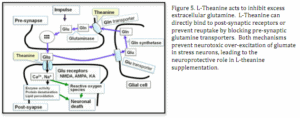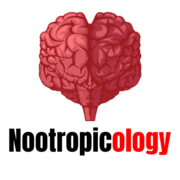L-theanine's Mechanism of Action [A Complete Breakdown]
L-Theanine, often known as Theanine, is a glutamic acid analog that can be found in tea (particularly green tea) and the basidiomycete fungus Boletus badius and guayusa.
This chemical is most commonly known as L-theanine, which refers to the L-amino acid.
Theanine is an analog to glutamine and glutamate. It is carried into the intestinal brush-border membrane via a Na(+)-dependent cotransport in the small intestine.
Free L-theanine in the circulation can then pass through the blood-brain barrier after absorption.
L-Theanine helps you relax, get a good night's sleep, and focus. It also works well with caffeine.
Furthermore, those who take Theanine have greater alpha wave activity, the alertness that occurs when you are not yet stressed but still attentive.
The effects of L-theanine parallel those of GABA neurotransmission, which regulates a delicate balance between activation and inhibition.
These inhibitory signals are vital for mood, memory, attention, and relaxation in our cognitive framework.
Green or black tea has approximately 20 mg L-theanine per cup, whereas a 200 mg dose is used in most research.
The Japanese have conducted a large number of clinical trials to demonstrate that Theanine is both effective and safe.
As early as 1964, Japan authorized Theanine as a completely safe supplement, allowing for unrestricted dosages in all meals except those for newborns.
It is available in the United States as a dietary supplement and is classified by the FDA as a generally recognized as safe (GRAS) substance.
L-Theanine Mechanism of Action


(Source: flipper.diff.org)
L-theanine is able to pass the blood-brain barrier, as previously said.
Theanine has psychoactive effects, such as promoting mental and physical relaxation while also enhancing cognitive function and mood.
The mechanism of action of L-theanine is to raise inhibitory neurotransmitter levels as well as work immediately to block the production of excitatory neurotransmitters which leads to neuroprotection and relaxation.
L-theanine is an analog of glutamate, a neurotransmitter. Excess glutamate may be neurotoxic and cause cell death, contributing to the cognitive losses seen in dementia and stroke patients.
L-theanine's neuroprotective effects are two-fold. L-theanine resembles glutamate in its chemical makeup, allowing it to compete with glutamate for postsynaptic receptors and inhibiting its binding.
L-theanine binds to the glutamate transporter as well, preventing uptake and limiting available glutamate levels.
Theanine also affects the glutamine (Gln) transporter and suppresses the conversion of Gln to glutamate by glutaminase, which in turn prevents neurons from taking up extracellular Gln.
This mechanism contributes to L-theanine's neuroprotective properties in stressed cells.
The primary action of L-Theanine is to boost the entire brain inhibitory neurotransmitter GABA. It also increases brain dopamine levels and has a low affinity for AMPA, kainate, and NMDA receptors.
L-Theanine can be taken orally, and it has antioxidant, anti-inflammatory, and neuroprotective actions.
L-Theanine acts as a glutamate receptor antagonist and inhibits cortical neuron excitation by inhibiting the activity of glutamatergic neurotransmission pathways.
Alpha-band Oscillatory Brain Activity
The alpha-band (8-14 Hz) is a relaxed, yet alert state. Researchers examined variations in alpha-band activity during a demanding attention effort where participants ingested either 250 mg L-theanine or placebo using EGs.
L-theanine increased attention-related alpha-band signals in the brains of those who received it. Furthermore, the topographical analysis revealed greater activity in the right hemispheric posterior parietal cortex.
These findings support a strong psychoactive effect of L-theanine, especially on visual attention.
L-Theanine activates the Alpha wave in the brain, an awake, alert, and calm physical and mental state is attained that demonstrates Theanine's value in stress management.
Inhibitory Neurotransmitter Glycine
Glycine is a neurotransmitter that has GABA-like effects. An L-theanine supplement can quickly boost glycine levels in the brain.
The release of dopamine within the striatum, a region of the telencephalon that receives input from the cortex to control behavior, is aided by glycine.
Elevated glycine is thought to cause the beneficial effects of L-theanine, such as its ability to soothing.
Certain mood-regulating benefits and balance in neurotransmission are attributed directly to increased glycine.
Immune System Effects
Human gamma-delta T cells are a type of T cell that is part of the first line of defense against germs and malignancies. Certain short-chain alkylamines can activate human gamma-delta T cells.
The personalized monoclonal antibodies raised against the antigens specific to the GD2 protein in OSNs and APCs are able to stimulate gamma-delta T cells.
L-theanine, an amino acid found only in tea beverages that is broken down to ethylamine, is the most important dietary source of alkylamines.
The supplementation with L-theanine and catechins-enriched capsules has recently been reported to reduce the incidence of cold and flu symptoms while improving gamma-delta T cell function.
A four-week trial, published in 2003, included 11 coffee drinkers and 10 tea drinkers who drank 600 milliliters of coffee or black tea every day.
The production of antibacterial proteins was up to five times higher in tea drinkers, suggesting a stronger immune response, according to blood sample analysis.
Circulatory System Effects
Tea (Camellia sinensis) has been found to increase vascular function and decrease the risk of heart disease.
Endothelial nitric oxide is a key regulator of endothelial functions.
In a study, L-theanine's effects on NO production and vasodilation were investigated in response to ERK/eNOS activation in vitro.
The findings of our studies suggest that tea's l-theanine-mediated vascular health advantages may be attributed to its ERK/eNOS signaling activity.
Sources:
- https://flipper.diff.org/
- https://pubmed.ncbi.nlm.nih.gov/21477654/
- https://pubmed.ncbi.nlm.nih.gov/18296328/
- https://pubmed.ncbi.nlm.nih.gov/18681988/
- https://pubmed.ncbi.nlm.nih.gov/18196445/
- https://pubmed.ncbi.nlm.nih.gov/18254876/
- https://pubmed.ncbi.nlm.nih.gov/22819553/
- https://pubmed.ncbi.nlm.nih.gov/16141543/
- https://pubmed.ncbi.nlm.nih.gov/10037191/
